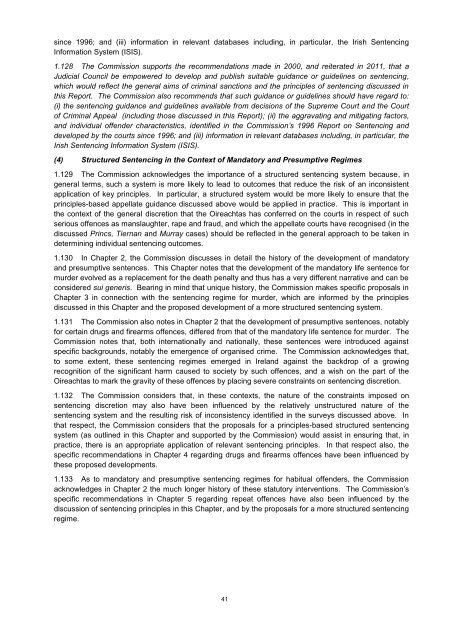Report on Mandatory Sentences - Law Reform Commission
Report on Mandatory Sentences - Law Reform Commission
Report on Mandatory Sentences - Law Reform Commission
You also want an ePaper? Increase the reach of your titles
YUMPU automatically turns print PDFs into web optimized ePapers that Google loves.
since 1996; and (iii) informati<strong>on</strong> in relevant databases including, in particular, the Irish Sentencing<br />
Informati<strong>on</strong> System (ISIS).<br />
1.128 The Commissi<strong>on</strong> supports the recommendati<strong>on</strong>s made in 2000, and reiterated in 2011, that a<br />
Judicial Council be empowered to develop and publish suitable guidance or guidelines <strong>on</strong> sentencing,<br />
which would reflect the general aims of criminal sancti<strong>on</strong>s and the principles of sentencing discussed in<br />
this <str<strong>on</strong>g>Report</str<strong>on</strong>g>. The Commissi<strong>on</strong> also recommends that such guidance or guidelines should have regard to:<br />
(i) the sentencing guidance and guidelines available from decisi<strong>on</strong>s of the Supreme Court and the Court<br />
of Criminal Appeal (including those discussed in this <str<strong>on</strong>g>Report</str<strong>on</strong>g>); (ii) the aggravating and mitigating factors,<br />
and individual offender characteristics, identified in the Commissi<strong>on</strong>’s 1996 <str<strong>on</strong>g>Report</str<strong>on</strong>g> <strong>on</strong> Sentencing and<br />
developed by the courts since 1996; and (iii) informati<strong>on</strong> in relevant databases including, in particular, the<br />
Irish Sentencing Informati<strong>on</strong> System (ISIS).<br />
(4) Structured Sentencing in the C<strong>on</strong>text of <strong>Mandatory</strong> and Presumptive Regimes<br />
1.129 The Commissi<strong>on</strong> acknowledges the importance of a structured sentencing system because, in<br />
general terms, such a system is more likely to lead to outcomes that reduce the risk of an inc<strong>on</strong>sistent<br />
applicati<strong>on</strong> of key principles. In particular, a structured system would be more likely to ensure that the<br />
principles-based appellate guidance discussed above would be applied in practice. This is important in<br />
the c<strong>on</strong>text of the general discreti<strong>on</strong> that the Oireachtas has c<strong>on</strong>ferred <strong>on</strong> the courts in respect of such<br />
serious offences as manslaughter, rape and fraud, and which the appellate courts have recognised (in the<br />
discussed Princs, Tiernan and Murray cases) should be reflected in the general approach to be taken in<br />
determining individual sentencing outcomes.<br />
1.130 In Chapter 2, the Commissi<strong>on</strong> discusses in detail the history of the development of mandatory<br />
and presumptive sentences. This Chapter notes that the development of the mandatory life sentence for<br />
murder evolved as a replacement for the death penalty and thus has a very different narrative and can be<br />
c<strong>on</strong>sidered sui generis. Bearing in mind that unique history, the Commissi<strong>on</strong> makes specific proposals in<br />
Chapter 3 in c<strong>on</strong>necti<strong>on</strong> with the sentencing regime for murder, which are informed by the principles<br />
discussed in this Chapter and the proposed development of a more structured sentencing system.<br />
1.131 The Commissi<strong>on</strong> also notes in Chapter 2 that the development of presumptive sentences, notably<br />
for certain drugs and firearms offences, differed from that of the mandatory life sentence for murder. The<br />
Commissi<strong>on</strong> notes that, both internati<strong>on</strong>ally and nati<strong>on</strong>ally, these sentences were introduced against<br />
specific backgrounds, notably the emergence of organised crime. The Commissi<strong>on</strong> acknowledges that,<br />
to some extent, these sentencing regimes emerged in Ireland against the backdrop of a growing<br />
recogniti<strong>on</strong> of the significant harm caused to society by such offences, and a wish <strong>on</strong> the part of the<br />
Oireachtas to mark the gravity of these offences by placing severe c<strong>on</strong>straints <strong>on</strong> sentencing discreti<strong>on</strong>.<br />
1.132 The Commissi<strong>on</strong> c<strong>on</strong>siders that, in these c<strong>on</strong>texts, the nature of the c<strong>on</strong>straints imposed <strong>on</strong><br />
sentencing discreti<strong>on</strong> may also have been influenced by the relatively unstructured nature of the<br />
sentencing system and the resulting risk of inc<strong>on</strong>sistency identified in the surveys discussed above. In<br />
that respect, the Commissi<strong>on</strong> c<strong>on</strong>siders that the proposals for a principles-based structured sentencing<br />
system (as outlined in this Chapter and supported by the Commissi<strong>on</strong>) would assist in ensuring that, in<br />
practice, there is an appropriate applicati<strong>on</strong> of relevant sentencing principles. In that respect also, the<br />
specific recommendati<strong>on</strong>s in Chapter 4 regarding drugs and firearms offences have been influenced by<br />
these proposed developments.<br />
1.133 As to mandatory and presumptive sentencing regimes for habitual offenders, the Commissi<strong>on</strong><br />
acknowledges in Chapter 2 the much l<strong>on</strong>ger history of these statutory interventi<strong>on</strong>s. The Commissi<strong>on</strong>’s<br />
specific recommendati<strong>on</strong>s in Chapter 5 regarding repeat offences have also been influenced by the<br />
discussi<strong>on</strong> of sentencing principles in this Chapter, and by the proposals for a more structured sentencing<br />
regime.<br />
41
















